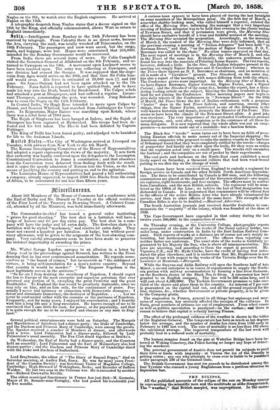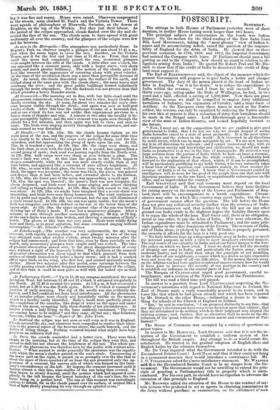THE ECLIPSE. All the published aecounts of the eclipse of
the sun on Monday concur in representing the scientific men and the multitude as alike disappointed. The " weather," that British marplot, was unpropitious. In the morn-
ing it was fine and sunny. Hopes were raised. Observers congregated in the streets, some climbed St. Paul's and the Victoria Tower. There were squads of philosophers at Blisworth, Swindon, on the downs at Brighton, on the top of the Wrekin. But they lost their labour. As the period of the eclipse approached, clouds floated over the sky and ob- scured the face of the sun. The clouds seem to have spread with great uniformity all over the country, and the glimpses of the eclipse were few and far between.
48 seen in the Metropolis.-The atmosphere was particularly dense. In Regent's Park an observer caught a glimpse of the sun about 11.41 a.m., just when the moon began to cover the sun. Another, on the Victoria 'rower, saw it for the first and last time at 11.90 a.m. From that time until the moon had completely passed the sun, occasional glimpses were caught between the rifts of the clouds. A little after one o'clock, the sun appeared like a crescent moon, only with a larger curve, very s points, and much greater brilliancy. The motion of the clouds gave the boat like crescent the appearance of careering along with great velocity.
At the time of the occultation there was a more than perceptible decrease of light. As usual, the clouds descended upon the surface of the earth, and drifted along at the same pace with the clouds above ; the same heavy mist overhung the river; and the great public buildings loomed indistinctly through the moist atmosphere. But the darkness was not greater than that which precedes a heavy thunder-storm.
At Greenwich.-The morning set in fine, with but little cloud until the phenomenon' commenced, when the sun was lost to view, heavy clouds gra- dually covering the sky. At noon, for about two minutes the sun's cres- cent hecame visible through the cloud ; and again was seen at half-past twelve o'clock. After this time the landscape became of a brownish tint, and at one o'clock its hue was not unlike that experienced previous to a heavy storm of thunder and rain. A minute or two after the totality it be- came perceptibly lighter, and the sun's crescent was again seen through the clouds for a few minutes, and then again was lost to view, and seen no more. The birds were singing merrily throughout the occurrence, and ani- mals seemed no way disturbed.
At Oundle..-" At 12h. 15w. 30s. the clouds became lighter on the right hand of the sun, and the progress of the eclipse for some little time w as clearly to be observed ; the cusps were perfectly sharp, and the line unbroken, and fast approaching the group of spots upon the sun. At 12h. 23m. 2s. it touched a spot. At 12h. 24m. 50s. the cusps were sharp, and the limb clear, as seen with the dark glass for a second, fast approaching a second group of spots ; dark scud was passing rapidly from the North-west. At 12h. 39m. both cusps were very sharp as seen without a glass. The moon's limb was even. At this time the gloom to the North began to deepen considerably, while the sun was more clearly visible than at any time before, and appeared like a crescent of pure silvery brightness. At 12h. 43m., as seen with dark glass, the lower cusp was sharp and well-de- fined, the upper was irregular ; the moon was black, the gloom was general and deeper than it had been before, and extended above to the horizon, At 1211. 46m. the lower part of the moon was approaching a small spot. At 12h. 47m. the spot was bisected ; the moon's limb was now irregular, the gloom deepened, and birds were heard some singing and others chirping and calling as though disturbed. At 12h. 50m. the lark ceased to rise, and was silent. At 12h. 53m. we might have imagined that a severe storm was impending, and birds were seen flying homewards. The wind continued to rise in gusts and squalls, the sky was overcast, but the sun still illuminated a circle round itself. At 12h. 56h. the sun was again visible; but the moon's limb was irregular, and better defined on the sun at the lower than at the upper edge. At 12h. 58m. the upper apparent edge of the sun was broken, showing one of Baily's beads. It was but a momentary glimpse. After a minute, as seen through another momentary glimpse, 60 deg. or 70 deg. of the sun's limbs was seen thus broken, and showing a succession of Baily's beads. The gloom at this time was very great. Birds were wildly flying here and there, as in great agitation, but some continued singing without interruption."-ilfr. Glaisher 's Observations.
At Peterborough.-The weather was very unfavourable, the sky being overcast, with rapidly moving clouds. A mere glimpse or two of the sun was obtained soon after twelve o'clock, about twenty minutes after the eclipse had'commenced ; and from that time, even by those carefully on the watch, only momentary glimpses were caught until one o'clock. The time of greatest obscuration passed over, to the great disappointment of every one, without a sight of the heavenly bodies. The darkness at the moment of greatest obscuration was about equal to that which proceeds from dark masses of clouds immediately before a heavy storm ; and it had a marked effect upon birds on the wing, who flew low, and seemed anxiously seeking shelter. About two minutes after this period, some openings between the swiftly passing clouds afforded frequent momentary glimpses of the eclipse, and at this time it could be seen quite as well with the naked eye as with glasses.
At Yotheringay Castle.-" Up to 11.40 my compass manifested the usual deviation West, but between 11.40 and 12 o'clock it advanced irregularly-to due North. At 12.49 it receded two points. At 1.6 p.m. it had recovered a point, but at '1.20 it was due North again. Before 2 o'clock it resumed the position of early morning. The dip of the needle was also evidently dis- turbed, and I feel confident not from local interference. All the phenomena of an annular eclipse were clearly and beautifully visible on the mound, which is a locality easily identified. Baily's beads were perfectly plain on the completion of the annulus, like drops of water on the upper and under sides of the moon, occupying fully three-fourths of her circumference. At twelve o'clock a. lady living on the farm suddenly exclaimed, The cows are coming home to be milked !' and they came, all but one ; that followed, however, within the hour."-Report of 3fr. John Yeats. In Scotland the eclipse was not seen so well even as it was in England. Clouds covered the sky, and observers were compelled to confine their atten- tion to the general aspect of the heavens above, the earth beneath, and the habits of living things. Nothing occurred beyond what might have hap- pened on an ordinary dull day. In Paris the crowds assembled had a better view. There were thick clouds in the morning, but at the time of the eclipse they were thin, and served to dull but not obscure the brightness of the sun. The whole pro- gress of the phenomena was therefore seen by the public with evident satis- faction. " What seemed to strike generally the spectators was the rapidity wills which the moon's shadow gained on the sun's circle. Commencing at the lower part on-the right, it passed on so promptly overthe disc that in about the space of three-quarters of an hour the sun presented only the ap- pearance of a crescent, the convex side of which was formed by the lumi- nary's circumference on the left. By degrees the crescent increased until it became almost a thin line, nine-tenths of the sun being then covered. It then began to slowly descend, until the portion which had appeared com- pletely to the left became the lowest boundary of the sun's face, the two orris being on a perfect level. The sun at this moment was exceedingly carious to behold, for as the clouds passed over its surface, it seemed like a boat of light slowly ploughing its way through an agitated ocean."



























 Previous page
Previous page